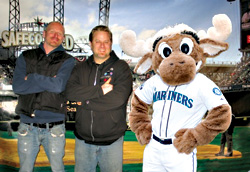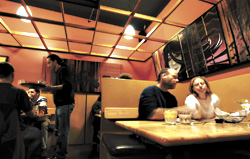Most people navigate through life safely within the lines. Then there are the few who are crazy enough to do something like drop out of school to open their own record store. In 1988, Matt Vaughan did just that, and it was taking the hard road, littered with stumbling blocks like debt and ever-changing technology, that led him to Easy Street, now one of the city’s premier independent sources for records. Almost 20 years, two stores, and one café later, he’s proof positive that Kanye’s College Dropout isn’t the only one who’s risen to the top.
How did you come to create the empire that is Easy Street?
I dropped out of Seattle University on registration day my sophomore year. The record shop I was working at in West Seattle (Penny Lane) was going out of business, and my boss needed to get out of town right quick. At the time, West Seattle was trying to redevelop itself; every other storefront was vacant. It was a challenging time to have a store out there, but equally challenging to be in the record business. Basically, I needed to find a way to pay the bills while trying to increase sales. One way to do that was to buy and sell used CDs, which not a lot of record stores were doing much of at the time. It made the CD price cheaper, which brought people in with more regularity. As stupid as it was to be owning and running an unsuccessful business, I didn’t need much money to get by, and I wasn’t playing by anyone’s rules. So for me it was pretty liberating. I had a couple of friends working for me under the table, and I worked seven days a week and had a bed in the back room. A year later (1989), things were going well enough that I moved the store a few doors down, on the corner of where it stands today. After 10 years there, I started to do in-stores/parties in a vacant space next door. I soon after took the space over, knocked down the wall, combined the spaces, and opened the café next door. At first we served just coffee. By 2001, I had opened a full-service café in the space, with breakfast, lunch, and beer. I never gave it a name; people just call it “the café.” In June of 2002, I opened the Queen Anne store. That was a huge undertaking for me. The World Trade Center tragedy, 9/11, occurred soon after I signed my lease, and my business loan never transpired. So, I had to refinance my house and did what I could to get the store open. My reasoning for moving downtown/Queen Anne was that I felt that Seattle deserved a good-sized, centrally located independent that carried more than just specialized music—one that was a true reflection of Seattle, its heritage, and its future. I also wanted to host in-stores in a way that hadn’t been done before. Treat the artists as if they were playing a real venue, have a real P.A. system, have a real sound guy and enough room so that you could see and hear the performance while showcasing their talent and latest release in a respectful manner.
So, today, here we are looking at a new configuration (the download). Basically, we’re back to where I was almost 20 years ago, when CDs were coming out and old-time record stores were shutting down. A new configuration, but this time I’m the old record-store guy trying to figure out how we are going to get through the challenge. For now, us indies have attracted some customers from the loss of the chain stores. We’ll see how it plays out.
How did you score the billboards that are up in the store?
That was a fun night.
Who would you say is your best customer?
This year I think [KEXP DJ] Kevin Cole takes that award.
Who are some of the most well-known patrons of the store, and what have they purchased?
Patti Smith tried to buy a Jimi Hendrix box set (of course we didn’t charge her). She said that Jimi Hendrix gets her through every tour. Walking around and shopping with Lou Reed [after he played an in-store] talking music for 10 minutes was pretty crazy. He bought only guitar music. I recall him buying Johnny Burnette Trio and fuzzy surf and country. But then he got to the Bowie section and the biggest smile came across his face, and he bought Bowie’s latest record and a reissue of Aladdin Sane. Tim Robbins comes in when he’s in town. He likes punk singles. Juliette Lewis bought a Blondie shirt. Bo Derek popped in and bought a Sinatra CD. Ben Harper popped in for breakfast at the café last year and bought a bunch of Bill Withers and Kris Kristofferson and later called us from Australia saying that these records were changing his life. Avril Lavigne and her band came in for breakfast a few years back. She had a copy of her video for “Sk8er Boi,” which she hadn’t seen yet. So we popped it in and we all watched it. That was pretty cute. The Beastie Boys called from the airport a few years back and said that none of their vinyl had made it from New York. Their tour was starting up the next day [at the KeyArena], and they needed some records to get through the first show. It was late and the store had closed already, but I met them at the shop and opened it for them until the wee hours [of] the night/early morning. Fun night. They bought a few boxes’ worth of records and apparently used it all for their Hello Nasty world tour.
Top five records of all time, or top five records to listen to while making pancakes on a Sunday morning:
Oh man, my High Fidelity moment.
1. Gillian Welch, Revival.
2. Zombies, Odessey and Oracle.
3. Velvet Underground, Loaded.
4. Waylon Jennings, Love of the Common People.
5. Luna, Penthouse.
A weekly peek behind the curtain of the Emerald City music world.






